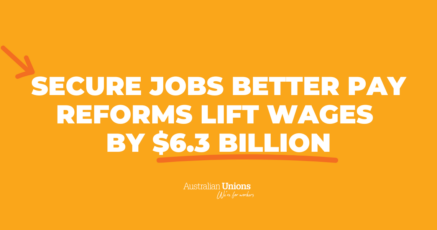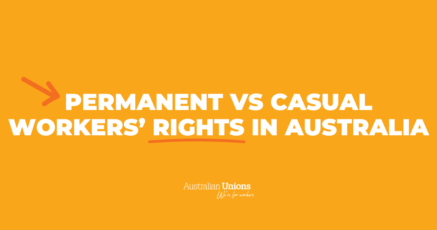Casual workers across Australia now have stronger rights and protections, thanks to new laws won by union members.
These changes came into effect on 26 August 2024 and provide casual workers with better rights, greater job security and pathways to permanent employment.
The new laws shift the balance of power towards protecting workers’ rights, giving casual employees stability and confidence in their work.
Here’s what you need to know!
A clearer definition of ‘casual’ worker
In 2021, the Morrison Coalition Government introduced a dodgy definition of a ‘casual employee’ which allowed employers to classify almost any worker as casual.
Thanks to union members and the Albanese Labor Government, this has now been replaced with a new definition that prioritises capturing the actual reality of a working relationship.
Under the new definition, the nature of the employment relationship must be assessed based on the true substance and reality of the job. That means an employee is a casual only if:
- there is no firm advance commitment to continuing and indefinite work, and
- the employee is entitled to a specific pay rate for casual employment
The new definition means that more roles will be offered as permanent, secure jobs, and only those that are truly ‘genuinely casual’ will remain casual. No more bosses indefinitely classifying roles as ‘casual’ as a means to deny workers secure work and entitlements.
Meaningful pathways to job security and protections
Eligible casual workers now have clearer and stronger grounds upon which to request to convert to permanent work if they meet certain criteria. This new pathway replaces the previous rules for casual conversion.
The new system makes the process more accessible for long-term casual workers to secure permanent roles if they wish to.
To be eligible, those in casual employment must have been employed for at least six months (or 12 months if working for a small business – that’s an employer with less than 15 employees) and believe they no longer meet the casual employee definition.
You can’t request to change to permanent employment if you’ve already made this request in the last six months, among other grounds.
You need to make the request in writing, and your employer must respond to you within 21 days and must give reasons if they deny the request.
If you don’t agree with the decision, you have extra rights now too – speak with your union to find out more.
Safeguards against exploitation
The new legislation also introduces safeguards to prevent employers from unfairly dismissing or threatening casual workers, only to re-engage them in casual roles.
If a casual worker faces retaliation or misrepresentation, there are legal avenues for dispute resolution and support through union representation.
A future with more secure jobs
These changes to the laws around casual work are a huge step forward in securing fair treatment and stronger protections for casual workers across Australia.
Already a union member?
Reach out to your union for more specific information about how you and your workmates can use these rights in your workplace.
Not yet a member of your union?
Joining your union will ensure you’re getting the new pay and conditions that you’re entitled to.







SHARE:
Strings attached: casual workers are no longer just a situationship